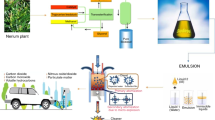Abstract
This paper aims at evaluating the performance of bio oils obtained from pyrolysis of three different biomass (namely Prosopis Juliflora seeds-PJS, Coconut shell-CS and Kiker seeds-KS) as fuels in a compression ignition engine. A single cylinder diesel engine developing a power output of 3.7 kW at 1500 rpm was used. A comparative study was made on the engine’s performance, emission and combustion behavior of three bio oils by converting them into their emulsions. Bio oil emulsions (namely PJSO10-Prosopis Juliflora emulsion, CSO10-Coconut shell emulsion and KSO10-Kiker seed emulsion) were prepared by mixing 10% of bio oils in the presence of 3% of a surfactant (span 80) with 87% of diesel by volume. Emulsions were tested in a single cylinder diesel engine for their performance as fuel. Engine test results showed comparable performance with all the emulsions of bio oil as compared to BD (Base diesel). CSO10 indicated the brake thermal efficiency very close to BD at all power outputs among the tested emulsions. Considerable reduction in smoke and NOx emissions were observed with all the emulsions of bio oil as compared to BD at all power outputs. Cylinder peak pressure and maximum rate of pressure rise indicated close values to BD at all power outputs with all the emulsions. Ignition delay was found as higher with all the tested emulsions as compared to BD at all power outputs. From the experimental findings it was concluded that bio oils obtained from Prosopis Juliflora seeds-PJS, Coconut shell-CS and Kiker seeds-KS can be used upto 10% by volume (without any modifications in the engine) as partial replacement of diesel by making emulsions with diesel with comparable performance and considerable reduction in smoke and NOx emissions. Among the emulsions the best choice can be CSO10 for better thermal efficiency and reduced emissions.
Similar content being viewed by others
References
M. S. Kumar, Experimental investigations on the efficient use of vegetable oils in diesel engines, Ph.D. Thesis, Indian Institute of Technology Madras, Chennai, India (2003).
N. Laksmono, M. Paraschiv, K. Loubar and M. Tazerout, Biodiesel production from biomass gasification via thermal/ catalytic cracking, Fuel Processing Technology, 106 (2013) 776–783.
L. Appels, J. Lauwers, J. Degrève, L. Helsen, B. Lievens, K. Willems, J. V. Impe and R. Dewil, Anaerobic digestion in global bio-energy production: Potential and research challenges, Renewable and Sustainable Energy Reviews, 15 (9) (2011) 4295–301.
A. Pattiya and S. Suttibak, Production of bio oil via fast pyrolysis of agricultural residues from cassava plantations in a fluidized bed reactor with a hot vapor filtration unit, Journal of Analytical and Applied Pyrolysis, 95 (2012) 221–235.
S. S. Toor and L. R. A. Rudolf, Hydrothermal liquefaction of biomass -A review of subcritical water technologies, Energy, 36 (2011) 2328–2342.
A. K. Hossain and P. A. Davies, Pyrolysis liquids and gases as alternative fuels in internal combustion engines–A review, Renewable and Sustainable Energy Reviews, 21 (2013) 165–189.
F. Abnisa, Optimization and characterization studies on biooil production from palm shell by pyrolysis using response surface methodology, Biomass and Bioenergy, 23 (2002) 307–314.
M. Mani, G. Nagarajan and S. Sampath, An experimental investigation on a DI diesel engine using waste plastic oil with exhaust gas recirculation, Fuel, 89 (2010) 1826–1832.
O. Arpa, R. Yumrutas and Z. Argunhan, Experimental investigation of the effects of diesel-like fuel obtained from waste lubrication oil on engine performance and exhaust emission, Fuel Processing Technology, 91 (2010) 1241–1249.
S. Murugan, M. C. Ramaswamy and G. Nagarajan, Performance, Emission and combustion Studies of A DI diesel engine using distilled tyre pyrolysis oil-diesel blends, Fuel Processing Technology, 89 (2008) 152–159.
S. I. Yang, T. C. Hsu, C. Y. Wu, K. H. Chen, Y. L. Hsu and Y. H. Li, Application of biomass fast pyrolysis part II: The effects that bio-pyrolysis oil has on the performance of diesel engines, Energy, 66 (2014) 172–180.
B. V. de Beld, E. Holle and J. Florijn, The use of pyrolysis oil and pyrolysis oil derived fuels in diesel engines for CHP applications, Applied Energy, 102 (2013) 190–197.
M. S. Kumar and K. Venkatesan, Experimental investigations on a diesel engine using coconut shell pyro oil (CSPO)–Diesel blends as fuel, Technical papers of Society of Automotive Engineers, Paper Number 2014-01-1377 (2014).
M. Mani, C. Subash and G. Nagarajan, Performance, emission and combustion characteristics of a DI diesel engine using waste plastic oil, Applied Thermal Engineering, 29 (13) (2009) 2738–2744.
M. Mani and G. Nagarajan, Influence of injection timing on performance, emission and combustion characteristics of a DI diesel engine running on waste plastic oil, Energy, 34 (10) (2009) 1617–1623.
S. H. Lee, T. Y. Kim and K. Y. Kang, Performance and emission characteristics of a diesel engine operated with wood pyrolysis oil, Proceedings of IMechE, Part D, 228 (2) (2014) 180–189.
S. Murugan, M. C. Ramaswamy and G. Nagarajan, Assessment of pyrolysis oil as an energy source for diesel engines, Fuel Processing Technology, 90 (2009) 67–74.
M. S. Kumar, J. Bellettre and M. Tazerout, Use of biofuel emulsions as fuel for diesel engines–A review, Proceedings of IMechE, Part A, JPE, 223 (2010) 729–742.
T. Kadota and H. Yamasaki, Recent advances in the combustion of water fuel emulsion, Progress in Energy and Combustion Science, 28 (5) (2002) 385–404.
M. S. Kumar and M. Jaikumar, A comprehensive study on performance, Emission and Combustion behavior of a Compression Ignition Engine Fuelled with WCO Emulsions as Fuel, Journal of the Energy Institute, 87 (3) (2014) 1743–9671.
E. G. Varuvel, N. Mrad, M. Tazerout and F. Aloui, Assessment of liquid fuel (bio-oil) production from waste fish fat and utilization in diesel engine, Applied Energy, 100 (2012) 249–257.
Author information
Authors and Affiliations
Corresponding author
Additional information
Recommended by Associate Editor Jeong Park
M. Senthil Kumar is presently working as an Associate Professor in the Department of Automobile Engineering, Madras Institute of Technology, Anna University, Chennai, India. He has been teaching and guiding for Ph.D. students since 1996. His main research interests include Alternative fuels for CI engines, Dual fuel engines and Engine and Heat transfer studies.
K. Venkatesan is presently working as an Associate Professor in the Department of Mechanical Engineering, S.K.P Engineering College, Thiruvannamalai, India. He is currently pursuing his doctoral research at Anna University, Chennai, India. He has been teaching and guiding for B.Tech and M.E. students since 1996. His main research interests include pyrolysis of biomass and alternative fuels for CI engines.
Rights and permissions
About this article
Cite this article
Masimalai, S., Kuppusamy, V. A comprehensive assessment on performance behavior of a CI engine using bio oil emulsions (PJSO10, KSO10 and CSO10) as fuels. J Mech Sci Technol 29, 4491–4498 (2015). https://doi.org/10.1007/s12206-015-0948-6
Received:
Revised:
Accepted:
Published:
Issue Date:
DOI: https://doi.org/10.1007/s12206-015-0948-6




